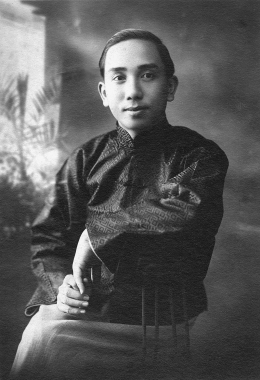
Lai Man-wai

Lai Man-wai (1893-1953), a pioneer of Hong Kong cinema, started his career with his first short narrative film Chuang Tzu Tests His Wife (1914) and continued for over forty years, earning him many “Firsts” in film history. He even brought his family and friends into the film industry, founded China Sun Motion Picture Company and United Photoplay Service Limited in Hong Kong and Shanghai, and mentored many newcomers. His influence was enormous and long-lasting, unprecedentedly connecting many talents and resources of both cities.
Film Came True
Lai always liked new ideas and things when he was a child. He was drawn to the newly invented photography and saved up enough to buy himself a camera. He also loved acting and watching films, realising filmmaking would become more popular and "film will be the leading force in entertainment and education". Through his good friend Lo Wing-cheung, he became friends with American Benjamin Brodsky. After making his monumental film Chuang Tzu Tests His Wife, he was only more drawn to the world of film. Lo Wing-cheung and him bought film books from America to study and in 1921, he finally convinced his brothers to open World Theatre together.
Looking Ahead
While running his own theatre, Lai realised that showing foreign films without support from the local industry wouldn't make the business successful. He envisioned owning a company to produce films. In 1923, he finally founded China Sun Motion Picture Company, the first locally-owned film company in Tin Hau, Hong Kong. In the same year, he made a huge number of newsreels, the first documentary about the 6th Far East Sport Games, recording opera artist Mei Lanfang's performances and Sun Yat-sen's revolutionary affairs.
In 1924, Lai purchased a piece of land in Guangzhou and built a studio for China Sun. In fact, Rouge, Hong Kong's first narrative feature was shot there. It was released during Chinese New Year in 1925 with rave reviews. However, a huge strike broke out in Hong Kong and the neighbouring regions, forcing Lai to move to Shanghai. Utilising the opportunities and talents, he founded China Sun Motion Picture Company (Shanghai). This created a connection between the two cities and their many filmmakers. When the war broke out, they moved south and came to Hong Kong, bringing along their expertise and experience.
China Sun (Shanghai) made a number of impressive films, such as Way Down West (1927) and Mulan Joins the Army (1928). In 1931, Lai and Lo Ming-yau founded United Photoplay Service Limited (Shanghai) and merged it with China Sun. "Reinstate Chinese films" was their goal. They produced Love and Duty (1931), Goddess (1934) and many other films. All of them were outstanding works in Chinese film history. However, United Photoplay Service was forced to restructure due to financial problems, and Lai brought China Sun (Shanghai) back to business.
In 1937, Battle of Shanghai broke out. Lai brought his camera to the front line and made The Battle of Shanghai (1937). He opened Qiming Production Company in 1940 yet it was burnt down, along with most of the Sun Yat-sen newsreels, when Japanese troops were bombing Hong Kong. He and his family moved to Guangzhou to take the refuge during Japanese Occupation. Until his death in 1953, he still worked as technical advisor for Yung Hwa Motion Picture Industries Ltd and owned Zenith Theatre. He was true filmmaker of a lifetime.
Lai Man-wai

Lai Man-wai (1893-1953), a pioneer of Hong Kong cinema, started his career with his first short narrative film Chuang Tzu Tests His Wife (1914) and continued for over forty years, earning him many “Firsts” in film history. He even brought his family and friends into the film industry, founded China Sun Motion Picture Company and United Photoplay Service Limited in Hong Kong and Shanghai, and mentored many newcomers. His influence was enormous and long-lasting, unprecedentedly connecting many talents and resources of both cities.
Film Came True
Lai always liked new ideas and things when he was a child. He was drawn to the newly invented photography and saved up enough to buy himself a camera. He also loved acting and watching films, realising filmmaking would become more popular and "film will be the leading force in entertainment and education". Through his good friend Lo Wing-cheung, he became friends with American Benjamin Brodsky. After making his monumental film Chuang Tzu Tests His Wife, he was only more drawn to the world of film. Lo Wing-cheung and him bought film books from America to study and in 1921, he finally convinced his brothers to open World Theatre together.
Looking Ahead
While running his own theatre, Lai realised that showing foreign films without support from the local industry wouldn't make the business successful. He envisioned owning a company to produce films. In 1923, he finally founded China Sun Motion Picture Company, the first locally-owned film company in Tin Hau, Hong Kong. In the same year, he made a huge number of newsreels, the first documentary about the 6th Far East Sport Games, recording opera artist Mei Lanfang's performances and Sun Yat-sen's revolutionary affairs.
In 1924, Lai purchased a piece of land in Guangzhou and built a studio for China Sun. In fact, Rouge, Hong Kong's first narrative feature was shot there. It was released during Chinese New Year in 1925 with rave reviews. However, a huge strike broke out in Hong Kong and the neighbouring regions, forcing Lai to move to Shanghai. Utilising the opportunities and talents, he founded China Sun Motion Picture Company (Shanghai). This created a connection between the two cities and their many filmmakers. When the war broke out, they moved south and came to Hong Kong, bringing along their expertise and experience.
China Sun (Shanghai) made a number of impressive films, such as Way Down West (1927) and Mulan Joins the Army (1928). In 1931, Lai and Lo Ming-yau founded United Photoplay Service Limited (Shanghai) and merged it with China Sun. "Reinstate Chinese films" was their goal. They produced Love and Duty (1931), Goddess (1934) and many other films. All of them were outstanding works in Chinese film history. However, United Photoplay Service was forced to restructure due to financial problems, and Lai brought China Sun (Shanghai) back to business.
In 1937, Battle of Shanghai broke out. Lai brought his camera to the front line and made The Battle of Shanghai (1937). He opened Qiming Production Company in 1940 yet it was burnt down, along with most of the Sun Yat-sen newsreels, when Japanese troops were bombing Hong Kong. He and his family moved to Guangzhou to take the refuge during Japanese Occupation. Until his death in 1953, he still worked as technical advisor for Yung Hwa Motion Picture Industries Ltd and owned Zenith Theatre. He was true filmmaker of a lifetime.














